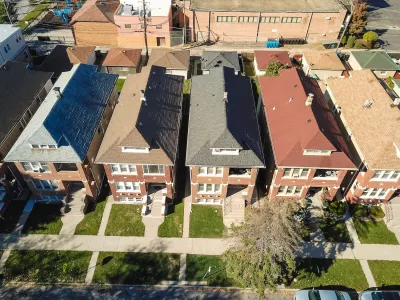Clybourne Park, a play exploring race, real estate, and community tensions, can set the stage for discussion on the lasting impacts of housing discrimination, gentrification, and the fight for affordability.

Clybourne Park, a Pulitzer- and Tony-winning play, recently staged at the Arvada Center in Colorado, uses satire and sharp dialogue to explore systemic racism, gentrification, and community identity — then and now. Set in a fictional South Chicago neighborhood, the play unfolds in two acts: the first in 1959 as a white couple sells their home to a Black family, and the second in 2009, with a white couple seeking to gentrify the same house in a now-majority-Black neighborhood.
The production, directed by Kenny Moten, highlights how deeply racism, classism, ableism, and exclusion are embedded in American society. Moten notes how these issues remain relevant today, challenging audiences to examine their role in division and disconnection.
The March 23 performance was followed by a community panel on housing issues, featuring experts from local affordable housing organizations and advocacy groups. They discussed the real-life housing crisis in Arvada — a suburb grappling with a $612,500 median home price — and the urgent need for collaboration to increase affordable housing access. Panelists emphasized how the arts can drive awareness and spark critical conversations around equity, displacement, and community futures.
Ultimately, Clybourne Park serves as both a mirror and a catalyst, encouraging audiences to reckon with the past and commit to building a more inclusive, just housing future.
FULL STORY: Clybourne Park on Stage, Housing Inequity in Real Life—A Post-Show Reflection

Alabama: Trump Terminates Settlements for Black Communities Harmed By Raw Sewage
Trump deemed the landmark civil rights agreement “illegal DEI and environmental justice policy.”

Planetizen Federal Action Tracker
A weekly monitor of how Trump’s orders and actions are impacting planners and planning in America.

The 120 Year Old Tiny Home Villages That Sheltered San Francisco’s Earthquake Refugees
More than a century ago, San Francisco mobilized to house thousands of residents displaced by the 1906 earthquake. Could their strategy offer a model for the present?

In Both Crashes and Crime, Public Transportation is Far Safer than Driving
Contrary to popular assumptions, public transportation has far lower crash and crime rates than automobile travel. For safer communities, improve and encourage transit travel.

Report: Zoning Reforms Should Complement Nashville’s Ambitious Transit Plan
Without reform, restrictive zoning codes will limit the impact of the city’s planned transit expansion and could exclude some of the residents who depend on transit the most.

Judge Orders Release of Frozen IRA, IIJA Funding
The decision is a victory for environmental groups who charged that freezing funds for critical infrastructure and disaster response programs caused “real and irreparable harm” to communities.
Urban Design for Planners 1: Software Tools
This six-course series explores essential urban design concepts using open source software and equips planners with the tools they need to participate fully in the urban design process.
Planning for Universal Design
Learn the tools for implementing Universal Design in planning regulations.
Clanton & Associates, Inc.
Jessamine County Fiscal Court
Institute for Housing and Urban Development Studies (IHS)
City of Grandview
Harvard GSD Executive Education
Toledo-Lucas County Plan Commissions
Salt Lake City
NYU Wagner Graduate School of Public Service




























